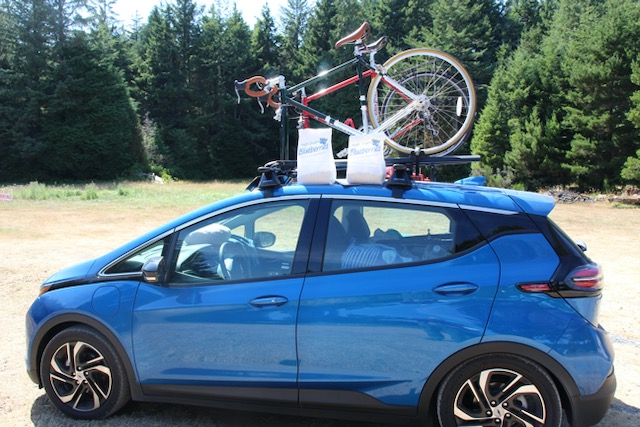March 21, 2022
How much does it cost to drive an electric car?
In July 2021, I bought an electric car ("EV"), a Chevy Bolt. I bought it in the wake[1] of the Pacific Northwest heat wave - intellectually I know that we must stop using fossil fuels as fast and as completely as possible; but after the heat wave I had to switch myself. I could not continue to drive a gas car, not on road trips to outdoor places I love, knowing I was making the next heat wave that much more likely or that much more damaging.

Electric cars are, first, cars; mostly, they drive and operate like gas ("ICE") cars. However there is a learning curve, especially if you’re road-tripping in one - learning when to charge and how much to charge at each stop; and how to manage energy and drive efficiently when needed or when to sprint. They promise a lot lower lifecycle greenhouse gas emissions [2][3], lower operating costs, lower maintenance costs, and never having to go to a gas station again; on the other hand they bring long charging times and have limited charging stations.
Climate is why I'm driving an electric car above all things; however I’d like to share a bit about how much it costs to drive electric by looking a whole month, February 2022 - let's see if the promise of lower operating costs bears out here.
I don’t have a daily commute - I work from home and have access to "L1" charging (a regular 120 volt outlet, $0.13 per kWh) at my apartment. However I drove a lot in February -- my girlfriend and I took two road trips, Seattle, WA to Champoeg State Park in Oregon for a camping/snowshoeing/birthday trip; and Seattle, WA to Gibsons, BC to visit family. All told, we drove 1,156 miles, totalling $53.80, averaging 4.6 cents per mile ($34.40 in DC Fast Charging costs and $19.40 in additional electric bills from apartment charging).
A gas car that averages 36 miles per gallon would’ve taken 32 gallons of gas to drive the same distance. At February’s average per-gallon price of $4.05 in Seattle, it would have cost $130, or roughly 11 cents per mile; at today’s gas price, it would have cost just over $150, or 13 cents per mile.
| Date | Odo | Charge % (kWh) | Where | How? | Cost |
| 2/4 | 11791 | 67% -> 69% (1.3 kWh) | Seattle, WA | L1 (120v outlet) | $0.16 |
| 2/4 | 11899 | 42% -> 60% (11.7 kWh) | Seattle, WA | L1 (120v outlet) | $1.52 |
| 2/5 | 11915 | 52% -> 93% (26.6 kWh) | Seattle, WA | L1 (120v) | $3.48 |
| 2/11 | 12113 | 15% -> 23% (5.2 kWh) | Wilsonville, OR | DC Fast Charger, Wilsonville Public Library | $6.21 |
| 2/11 | 12125 | 20% -> 42% (14.3 kWh) | Champoeg, OR | Champoeg State Park RV site, L1 (120v) | $0 |
| 2/12 | 12137 | 39% -> 74% (22.75 kWh) | Wilsonville, OR | DC Fast Charger, Wilsonville Public Library | $5 |
| 2/12 | 12251 | 24% -> 62% (24.7 kWh) | Portland, OR | East Portland | $5 |
| 2/12 | 12348 | 15% -> 62% (30.5 kWh) | Centralia, WA | Centralia Civil Aviation | $10.94 |
| 2/13 | 12441 | 15% -> 40% (16.2 kWh) | Seattle, WA | L1 (120v outlet) | $2.10 |
| 2/13 | 12497 | 19% -> 33% (9.1 kWh) | Tacoma, WA | L2, Tacoma Zoo | $0 |
| 2/13 | 12545 | 13% -> 49% (23.4 kWh) | Seattle, WA | L1 (120v outlet) | $3.04 |
| 2/14 | 12554 | 44% -> 92% (31 kWh) | Seattle, WA | L1 (120v outlet) | $4.03 |
| 2/18 | 20457 km (we _were_ in Canada!) | 23% -> 88% (42.2 kWh) | Gibsons, BC | L1 (120v outlet) | - |
| 2/21 | 12801 | 44% -> 70% (16.9 kWh) | Bellingham, WA | DC Fast Charger, Bellingham Whole Foods | $7.25 |
| 2/22 | 12883 | 27% -> 87% (39 kWh) | Seattle, WA | L1 (120v outlet) | $5.07 |
| Total | $53.80 |
Looking at a full month of electric car charging has been instructive - home (even 120v) charging is very cheap per-mile; DC Fast Charging costs are variable. Even the most expensive fast charging sessions (half the battery!) was under $11 though. Electric cars currently have higher initial prices than gas ones and there is not a robust used market available; but once those initial costs are overcome, driving costs are lower.
I will write about road-tripping in the summer and winter with a Bolt soon; until then, hope this snapshot of charging costs is helpful!
[1]: I mean wake in the full sense of the word.
[2]: https://environment.yale.edu/news/article/yse-study-finds-electric-vehicles-provide-lower-carbon-emissions-through-additional
[3]: https://blog.ucsusa.org/dave-reichmuth/are-electric-vehicles-really-better-for-the-climate-yes-heres-why/